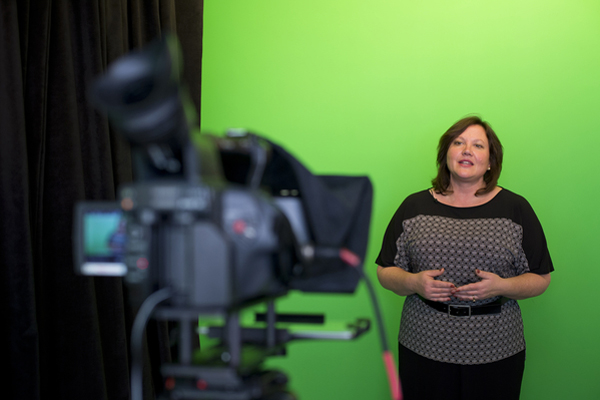Northeastern launches Social Impact Lab to empower global change

Northeastern University has launched the Social Impact Lab—a hub of innovative experiential curricula, programming, and events designed to empower social change and civic engagement across disciplines and around the world.
Rebecca Riccio, the founding program director of Northeastern Students4Giving, has been appointed director of the lab, which will be housed within the College of Social Sciences and Humanities. Its signature program is “Giving With Purpose,” the first-ever massive open online course focusing on philanthropy and informed civic engagement.
“The MOOC epitomizes our vision of the Social Impact Lab as a conduit between theory and practice—a platform for students to apply what they are learning in the classroom to real-world challenges and opportunities,” Riccio said. “Our goal is to give students a comprehensive toolkit for translating good intentions into effective, financially sustainable strategies for achieving social change.”

Doris Buffett, right, founder of the Learning by Giving Foundation, met with Northeastern students while attending the Northeastern Students4Giving fifth anniversary awards ceremony last year. Photo by Brooks Canaday.
The MOOC was created in partnership with the Learning by Giving Foundation, which was founded by Doris Buffett, sister of billionaire businessman and philanthropist Warren Buffett. The foundation promotes philanthropy at the undergraduate level with the hope of inspiring students to become leaders in their communities.
“It is a challenge and responsibility that we work together to create a global culture of philanthropy,” said Joseph E. Aoun, president of Northeastern University. “This MOOC is leading the field with its model of experiential philanthropy and will drive new ways of giving across platforms, continents, and generations.”
“Giving With Purpose” was first offered in Summer 2013 to educate the public about tips and strategies for effective charitable giving through six compact, online classes. The free online course will re-launch in March 2014 and will be offered as a credit-bearing course in Fall 2014.
“I am invested in sharing my passion for philanthropy with the next generation of philanthropic leaders,” Buffett said. “‘Giving With Purpose’ exceeded all of our expectations last summer, and we are thrilled to have the opportunity to offer it again this spring with Northeastern University.”
Riccio will teach the course, which features two educational tracks. “Givers” nominate nonprofit organizations in their communities to receive a grant and then assess each other’s nominations using Riccio’s assessment tool. “Learners” do not nominate organizations, but still participate in the peer assessment process. Both groups receive a certificate upon completion. Grants will be awarded to the highest-rated nonprofit organizations at the end of the course.
Weekly lessons will introduce tools and strategies to help donors at any level invest in high-performing community-based nonprofit organizations. More than 10,000 people participated in the first Giving With Purpose course in 2013 and helped distribute $130,000 to 40 U.S. nonprofit organizations.
In addition to the MOOC, the Social Impact Lab supports several experiential learning programs that bridge the classroom and the community. Students participating in the lab’s philanthropy education program, Northeastern Students4Giving, study civic engagement and social change while making real-dollar grants to Boston-area nonprofits.
NS4G is part of the Human Services Program at Northeastern. This year’s NS4G grants will be awarded to organizations working in two areas: trauma treatment and diversity and inclusion. The lab’s annual Social Impact Conference—which will be held April 7 and is titled “Know Your Place: Unleashing the Power of Local Philanthropy”—will convene students and faculty as well as policy makers and leaders of the nonprofit and philanthropy sectors to discuss how philanthropic investments can best be leveraged to complement government and private funding to address contemporary urban challenges.





